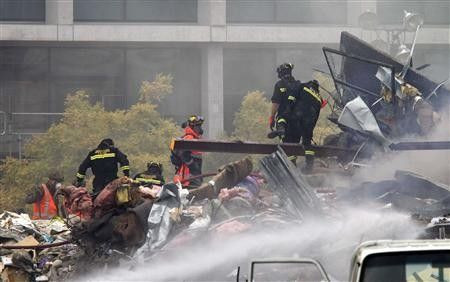Foreign rescue teams join search for NZ quake survivors

Hundreds of foreign rescuers will join exhausted New Zealand teams Thursday in an increasingly desperate search of quake-shattered buildings in central Christchurch as time runs out to find survivors buried under rubble.
Officials have abandoned hope of finding anyone alive in the collapsed Canterbury Television (CTV) building in the city centre, including foreign students at a third-floor language school, with a grader moving in to clear debris.
Police warned about the possible collapse of a 26-story hotel unleashing a domino effect on surrounding building.
Christchurch Mayor Bob Parker said the quake-prone city now faced hard decisions on rebuilding its heart.
We are not going to walk away from this place, Parker told New Zealand television. We may have to level entire blocks in some places.
The Director of New Zealand's Ministry of Civil Defence and Emergency Management, John Hamilton, has said rescue teams have a window of only two or three days to find people after Tuesday's 6.3-magnitude earthquake.
Seventy-five people have been confirmed dead, but that toll was expected to rise with more than 300 people missing in the country's second-biggest city. Up to 100 of those were thought to be in the CTV building, police said.
Much of the city remained without power and water, and hundreds of people queued for water supplies brought in.
It was New Zealand's most deadly natural disaster for 80 years, and one estimate said the damage could cost $12 billion.
To avoid more deaths and curb crime, police and the military placed an overnight curfew on the central business district, with soldiers patrolling in armoured personnel carriers as aftershocks rattled the unstable centre.
Authorities also placed an exclusion zone around the hotel, which teetered near collapse, threatening nearby buildings.
If the Hotel Grand Chancellor falls, and three engineers say it is a significant risk, that will be dramatic, a domino effect in the central city of other unstable buildings. It will be a major disaster, said police Superintendent Dave Cliff.
Rescue teams had to perform amputations to free some of the 120 survivors pulled from the wreckage of the tremor, which was the second strong quake to hit the historic tourist city in five months.
But there were moments of elation. A woman, Ann Bodkin, was rescued from a destroyed finance company building after a day trapped under a desk.
Cliff said as many as 100 bodies could be under the television building, while scores more could lie beneath the city's shattered cathedral and other nearby buildings.
A national state of emergency has been declared. It is the country's worst natural disaster since a 1931 quake in the North Island city of Napier which killed 256.
Christchurch Hospital received an influx of injured residents, with broken limbs, crush injuries and lacerations.
Thousands of people were facing a second night in emergency shelters in local schools, community halls and at a racecourse. Pope Benedict sent a message of support for survivors and rescuers from the Vatican.
My thoughts turn especially to the people there who are being severely tested by this tragedy, he said. I also ask you to join me in praying for all who have lost their lives.
Rescuers from the United States, Britain, Taiwan and Japan arrive in New Zealand Thursday, with the first of 148 Australian specialists already on the streets.
ECONOMIC IMPACT
Indications of the big economic impact of the quake are starting to emerge. J.P. Morgan estimated insured losses could be $12 billion, according to a source who had seen a research note.
When asked about possible costs, Prime minister John Key told reporters: No one's in a position to actually assess that. He said he hoped Christchurch could still host rugby World Cup matches later this year as planned.
Key said the country could afford to rebuild Christchurch, but reinsurance risk would probably worsen.
Catastrophe modelling firm AIR Worldwide Estimates said the insurance industry faces damage claims of between NZ$5 billion ($3.5 billion) and NZ$11.5 billion ($8 billion).
Reinsurers Munich Re, Swiss Re and Hannover Re, who help insurers cover big losses, took many weeks to provide damage estimates from the September quake due to complexities of assessing structural damage to buildings.
The disaster fuelled talk that the central bank might cut interest rates in coming weeks to shore up confidence in the already-fragile national economy, but the bank did not mention monetary policy Wednesday when it commented on the quake.
Seeing the quake as a further blow to the economy, Standard Chartered bank is revising down its 2011 GDP growth forecast for New Zealand to 1.4 percent and 2.7 percent for 2012 -- from 2.0 percent and 3.0 percent respectively, because of a double-dip in the housing market, tightening budget and sluggish local demand. ($1 = 1.339 New Zealand dollars)
© Copyright Thomson Reuters {{Year}}. All rights reserved.





















